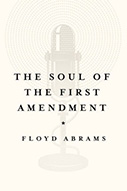The Soul Of The First Amendment

Author: Floyd Abrams
Publisher: New Haven, CT: Yale University Press, 2017. 145 p.
Reviewer: David Schultz | March 2019
The First Amendment declares that Congress shall pass no law abridging freedom of speech. Elegantly simple in prose and promise, the problem is what does this prohibition really mean? What is speech and what constitutes abridgment from a constitutional perspective? Answering both of these questions is the task of Floyd Abrams, one of the most famous First Amendment attorneys in the United States, winning notable cases including New York Times Co. v. United States, 403 U.S. 713 (1971), upholding the right of a newspaper to publish the Pentagon Papers. This book, divided into six sections, constitutes Abrams’ “ruminations” on the meaning of the first Amendment (ix). In it he seeks to elucidate what he thinks the First Amendment protects, and what the broad protection afforded to speech mean for the United States and for democracy.
Drawing upon the constitutional framing and debates, Abrams in general sees the purpose of the First Amendment as preventing governmental interference in religion, speech, and press. It is nearly an absolutist position he takes, endorsing not only the rights of dissidents, communists, Nazis, abortion-protestors, and those who espouse hate speech to speak their mind, but also the rights of corporations and unions to speak on political issues. The latter protection renders unconstitutional laws that seek to limit the role of money in politics. The core of the book is taking pride in the notion that the United States allows for more unregulated speech than perhaps any other democracy or country in the world.
In broad strokes Abrams’ arguments sound great, but in details the book falls flat in that it fails to address many of the core issues surrounding the First Amendment. At no point does he seek to clarify the lines between free speech versus harassment or threats, nor does he address distinctions in terms of categories of speech. For example, does he agree or disagree that child pornography is not protected speech, or that the government can regulate deceptive commercial advertising? Why should flag burning be considered speech but blackmailing someone not? Moreover, in his rush to defend the United States exceptionalism with the First Amendment he ignores how often competing free speech claims need to be reconciled, or how his view of democracy as simply celebration of free speech is a reductionist theory that privileges one freedom at the expense of others. His argument ignores how in the areas of campaign spending his commodification of the First Amendment means that the rich have more rights than the poor. Abrams also seems to assume that because the United States protects more offensive speech than other countries we are freer and more democratic than other countries. All these embedded assumptions in his ruminations go without much defense or analysis.
This book is more a single-dimensional series of observations of speech than a developed theory of speech, the Constitution, and American democracy. For those who wish to read a book offering really a simplistic theory of free speech that celebrates a few major Supreme Court decisions, Abram’s discussion is fine. But it does not offer much more than really a thin theory of speech.
David Schultz is Hamline University professor in the School of Business where he teaches classes in public administration. He is also a professor at the University of Minnesota School of Law.


